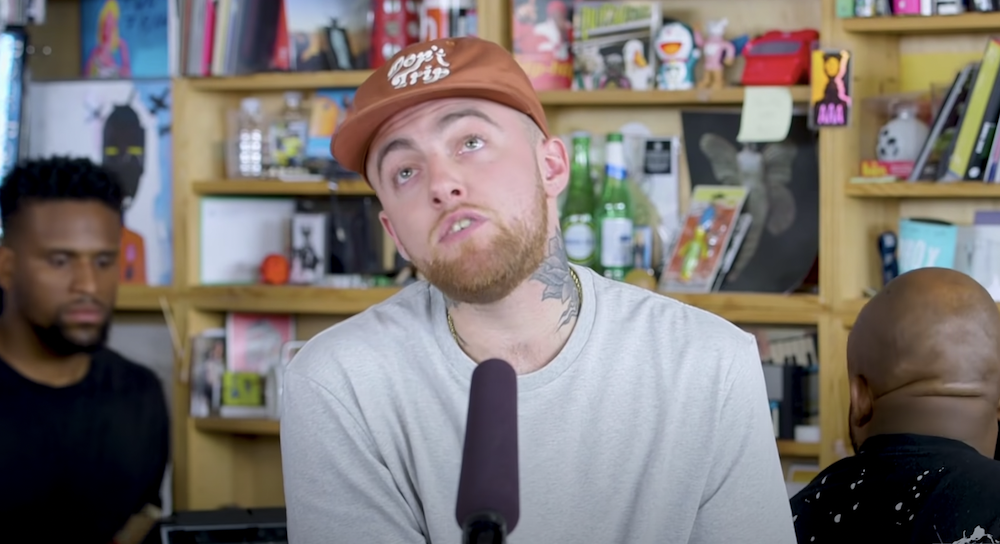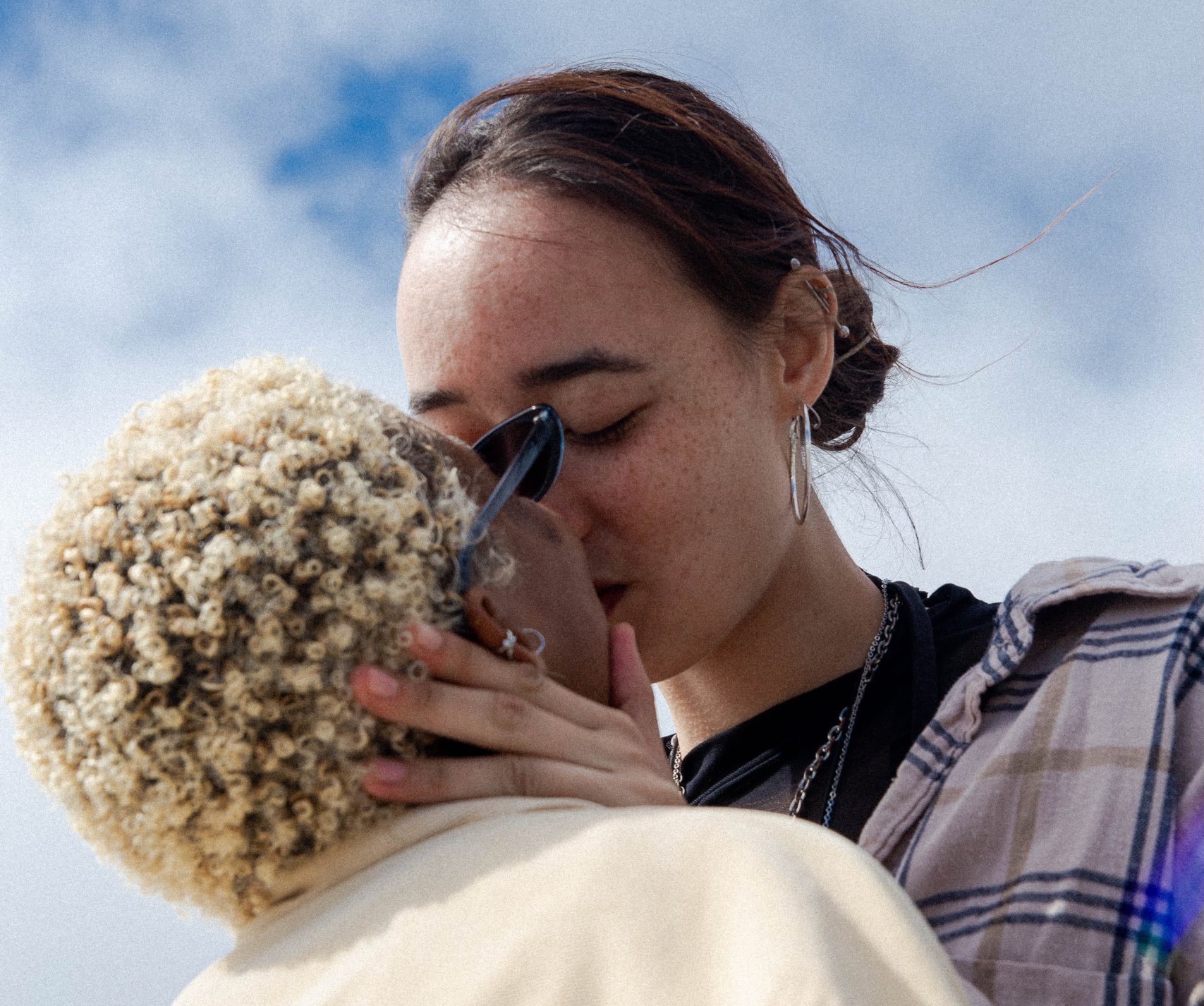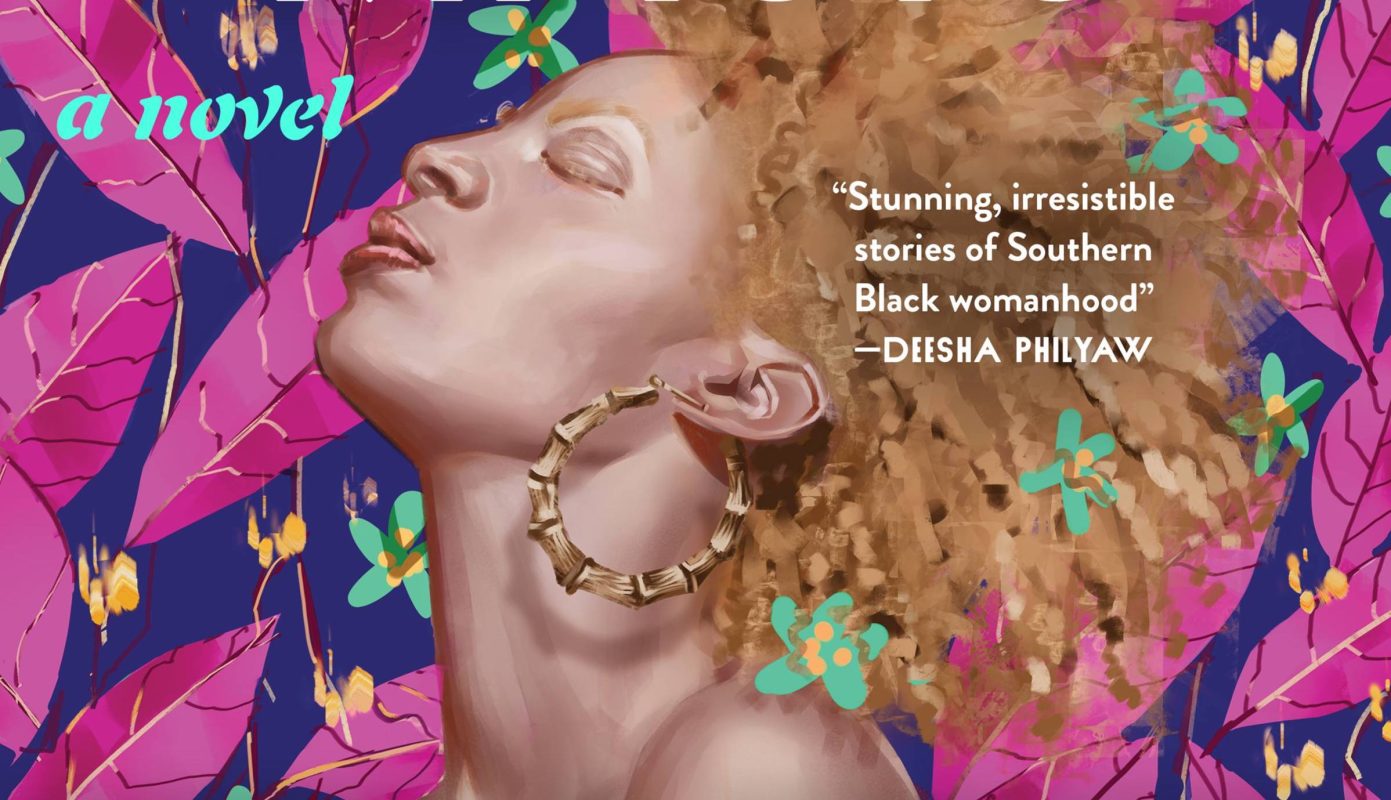Books & Culture
I Blamed Mac Miller for My Failed Interracial Relationship
Then I found healing in his lyrics

In August 2011, 19-year-old Mac Miller headlined Boston Urban Music Festival, a free show at City Hall Plaza outside Boston’s Government Center. It was the summer going into my sophomore year of high school. From a distance, I imagined how the festival would go down: my classmates smuggling booze in flattened Poland Springs water bottles, loosening their limbs against the summer heat. They would sing along to upbeat lyrics about haters and hoes, and afterwards, in the warm haze of post-concert exhaustion, they would performatively recall their exploits, the fun they’d had. I say from a distance, because I hadn’t gone. I wasn’t cool enough and my parents were unlikely to be convinced that a concert the size of a third of my hometown was a good idea. Back then, my Vietnamese parents possessed a general suspicion of American pop culture and the unknowable extent of its power over the young. They had been warned that if they weren’t careful, it could snatch up their babies, strip us of our mother tongue. From there, who knew what could happen? Normally, I would have pushed back, called them old fashioned. But with Mac Miller, I didn’t bother. I didn’t like his music anyway.
No matter how unfair and untrue, Mac Miller was, to me, an agent of some unnamed force set out to perpetuate and widen a gap I imagined was between me and the male attention I craved. He was a white boy who rapped about smoking weed, partying, and getting head. (“I just wanna ride, ride through the city in a Cutlass” he raps in his 2011 song regretfully titled “Donald Trump.” “Find a big butt bitch, somewhere get my nuts kissed.”) I was a gawky Asian kid who bemoaned the death of romance. With vocabulary freshly gleaned from mainstream feminism, I broadly rejected his lyrics on the basis that they were “misogynist” and “objectifying.” Sexism offered me a convenient argument onto which I could map my objection. Now thinking about it more deeply, I can’t in good conscience say that that was really why I didn’t like his music. In truth, what bothered me wasn’t the content of his albums, but how easily the white kids around me could see themselves in it. I resented the idea that they found license from his words to be carefree and cool, while I felt pinned to my lanky body, trapped in what felt like a perpetual state of non-adulthood.
The mutual relatability between artist and audience can’t be untangled from Mac Miller’s and my classmates’ suburban whiteness (“If you don’t know, I’m from the burbs” Mac announces in “Kool Aid & Frozen Pizza”), and my resentment couldn’t be untangled from my being Asian. As a rapper, Mac Miller was working within a Black genre. Early on in his career, his lyrics kept to an uninspiring set of topics: getting high, getting rich, and partying—a move that nestled him into the sub-genre of “frat rap.” As a reward for staying in this lane, critics considered him “bland” but “harmless”—conditions that might have actually sparked his initial rise to fame. Conceding, even highlighting his whiteness (“Everything good, I’m white boy awesome / Up all night, Johnny Carson”) might have seemed necessary to Mac Miller at the time, but I can’t know that for sure. What I do know is that it made me painfully aware of my Asianness.
I didn’t want to be white, but I wanted what I thought whiteness ensured: independence, desirability.
At fifteen, it felt like everything new was tunneling toward me all at once. I made a terrible show of pretending I’d seen and heard it all before. Secretly, I regarded my peers with a mixture of admiration and envy. Here were kids who had learned to wield their bodies in ways worthy of popular lyrics. I wanted that. I wanted to be wanted, but I saw no way to bridge the gap between my experience and that of the music, no possible entry point into a world that was all around me but somehow still beyond my reach. That’s why I couldn’t stand Mac Miller’s music. Not so much because it didn’t live up to my feminist ideals, or because I thought it was artistically bereft, or any explanation that might have had a chance of holding up against intellectual scrutiny. I was insecure. I wanted bigger boobs and a bigger ass, something that seemed visibly at odds with my genetics. I didn’t want to be white, but I wanted what I thought whiteness ensured: independence, desirability.
My righteousness, as it turned out, thrived on the begrudged acceptance that among the boys I had grown up with, I would forever be seen as unsexual. A friend, maybe even a pretty one if they meditated on my face long enough. But not hot or sexy or like that. This too, I blamed on race. Growing up, “you’re pretty for an Asian” was meant to be a compliment. That I was not completely unattractive as an Asian girl seemed to be something of a marvel, not a given. The idea that Asian women are hypersexualized—a problem that has made it into mainstream conversation in recent years—is not something I encountered until college. (Though the two ideas may seem contradictory, I am asking you to trust that several things can be true at once.)
And then the boy I liked liked me back. Funny how quickly I traded in my righteousness for being wanted! How to explain it? To be desired—to feel chosen—felt like being freed, at last, from the burden of keeping all that love to myself. And from under all that weight, I emerged light, new. I could sense myself moving through the world differently, the way I assumed my friends had moved all along. If you have never felt that way before, then such a description can sound sentimental and untrue. But if you have—if you’ve ever found yourself in the dark mess of girlhood—then you know, or perhaps can empathize.
L was, in some ways, just like me. He had an insecurity I recognized, the anxiousness of a kid just coming into their body. I met him in tenth grade geometry class where the seats were arranged in alphabetical order, except that another student had a hard time seeing the board, so our teacher changed L’s seat from the front of the classroom toward the back, next to me. Later, we would return to that moment, cite it as kismet. In the beginning, to bypass having to talk about ourselves, we roasted our classmates. We nitpicked grammar. It was a clumsy way of flirting, but I hadn’t yet become the kind of person who could not find joy in anything less than clever. I was delighted by the tiniest, most tentative of gestures as if they were electric. We exchanged typos we saw on posters, Facebook, white boards, and turned them into inside jokes. Then one day, L pointed out the word “its” in class, thinking that the possessive form needed an apostrophe. I told him that the current spelling was indeed correct, but his mistake—which so plainly revealed his earnestness—endeared him to me completely. Up until that point, it had not occurred to me that he was trying to impress me—that he did not regularly find amusement in grammar, and was otherwise unlikely to send text messages in complete sentences. Even now, thinking of that time, I feel a pang of loss knowing we will never be those wide-eyed, willing kids again.
It was a clumsy way of flirting, but I hadn’t yet become the kind of person who could not find joy in anything less than clever.
Unlike me though, L was white. He had parents who let him stay out late, do all the teenage things I wasn’t allowed to do. For our first date, my cousin had to cover for me while L and I rode the train into the city for sandwiches and mac and cheese, something he apparently could do with friends on the regular. On weekends, L partied with our classmates. Going out was routine to him, rather than the result of elaborate planning and lying—like it seemed was necessary for me to go anywhere after school hours. We started dating, but it wasn’t long before those old feelings of resentment and jealousy crept back up. I coveted his freedom, his ease. In the back of my mind, it was no surprise that he listened to Mac Miller.
In some ways, it was a classic on-and-off relationship. Over the next eight years, L and I would start and stop again: through college, through my first adult job, through his move to New York. When I picture the relationship as a timeline, it looks vaguely like morse code, a series of dots and dashes but without any of the clean logic. It felt like we were never on the same page, worried that being together held us back, worried that not being together meant we were doomed to feel that loss forever. Part of that could easily be attributed to our age. It was the 2010s. We were later millennials who could have dating apps and social media not just as tools, but as extensions of ourselves. The paradox of choice, not just in partners, but entire lives was always there, picking at our peace. But part of me and L’s incompatibility, too, I believed, was race. You just don’t get it, I’d cry after trying to explain why Certain Things were a Big Deal. People of color with white friends know what I’m talking about. By the end of those conversations I sometimes worried I had become tedious, and I blamed him for reducing me to the no-fun nagging girlfriend archetype instead of the carefree twenty-something I felt entitled to being. Naturally, this frustration bled into the rest of our relationship.
I had not gotten over that base insecurity I felt when all those white kids from school went to the Mac Miller concert. Between me and L, tensions over race distilled into the simplest, most humiliating form of objection: envy. I was suspicious of L’s love for me, worried that his version of greener pastures was a white girl conjured from the aesthetic of Mac Miller lyrics: pretty, dressed in short shorts, blowing smoke rings at the camera. This girl was laid back, probably enjoyed giving head always, and was unlikely to bring up discussions of race—because why would she? Sometimes she was imagined, but sometimes some version of her was real, a flesh and blood person L dated or hooked up with that I could run into in real life and compare myself to on Instagram. Either way, her right to his love seemed enshrined. Privately, I regarded my body as a mass of exertion and effort, and I thought him loving it would require the same. At some point, I just didn’t want to try so hard anymore. I needed a reason to give up.
I was suspicious of L’s love for me, worried that his version of greener pastures was a white girl conjured from the aesthetic of Mac Miller lyrics.
Towards the end, I decided L would never get me, not fully, because I was Asian and he was white. I began to point out this inadequacy to him every chance I got. I was cruel in my relentlessness, in my insistence that there was no remedy for us. If we stayed together, I thought, this would be the permanent state of affairs. “You think life is so simple,” Ida, a Black woman says to her white lover, Vivaldo in James Baldwin’s Another Country. “I always think of you as being a very nice boy who doesn’t know what the score is, who’ll maybe never find out. And I don’t want to be the one to teach you.” In Baldwin’s words I felt seen. I shared if not in Ida’s suffering (life—this country—was far crueler to her than me), then in some of her grief, her rage. White men! I thought, reading the passage again and again. During some of the most fraught times in the relationship, I grasped for Baldwin’s words and felt less alone. But feeling seen could never be the whole of my healing. Soon, I learned, I would need to do the seeing, too.
Mac Miller released Swimming in 2018, just months before his death from an accidental overdose. The entire album is oppressive—a drawn out exploration of a tortured headspace. I could not stop listening to it. I played it over and over. The album’s soundscape is sparse—a punctuating bass drum that resembles a heartbeat or gulps of air, instruments flowing in and out like distinct, but often unfinished thoughts. The lyrics were clear, delivered in Mac’s depressed baritone. I wanted to stay there forever. Every minute that passed filled me with a sense that I was beginning to grasp something vital that had eluded me for so long. In the music, I could see the boy I once tried to love into some self-projected version of wholeness. I had wanted L to see he was white, really see it, as if all that looking could compound over time to make up for all the ways he would never know me. Here’s the thing I’ve realized, which I should maybe have known all along: insisting L didn’t understand me had never made him understand me better.
Swimming’s penultimate song, “2009” opens with a whole minute of mournful strings underlined with soft piano keys. Yet, the lyrics tell a story of not lament but resignation: “Now every day I wake up and breathe / I don’t have it all but that’s alright with me.” On one of the last days I went to see L in New York, I no longer had it in me to fight. I remember laying there, next to him, fitting my face into the space between his neck and shoulder, waiting for the rhythm of our breathing to fall in sync. For a long time afterwards, I felt adrift. Race stopped being a sufficient answer for why it didn’t work out. I was still in a lot of pain, feeling my way around the dark for closure. Then I listened to “2009” and something clicked. Finally, I stopped my pursuit of answers to just listen. Right there, in songs written by a total stranger, was the pain I imagined L had tried to express but could not articulate. It was like walking to meet his hurt up close. He too, I realized, must have been tired. How had I not seen that before?
From Swimming I worked backwards and forwards, tracing the jagged timeline of our relationship, stopping any time the music seemed to fill the space of my questions. We can’t talk about Mac Miller and romantic love without talking about The Divine Feminine. The album came out in 2016 during my last year of college and I had heard some songs in passing at parties (e.g. “God is Fair, Sexy, Nasty” ft. Kendrick Lamar, “Dang!” ft. anderson.Paak). Taken out of context, some of it can seem gratuitous. The album is filled with sexually explicit lyrics riding along undercurrents of funk and jazz. But when I finally listened to the album in full years after its initial release, the sex struck me as honest, vulnerable. In “Soulmate,” for example, around the second verse, after the lyrics and cacophony of instruments have had time to layer into a blanket of sound that presses down on you, the volume of the instruments dip, leaving only the quiet hum of a synthesizer. Then Mac sings, “Why don’t you call my name?” It feels like a punch to the throat. The first time I heard it, I recognized the hurt behind it immediately. There are arguably other lyrics in the album that are more poetic, more formally accomplished. But the simplicity of that line gets me. In it you can hear how the artist has been stripped of the sounds and clever wordplay that have kept him afloat up until that point. I think of Hanif Abdurraqib’s observation of such moments: “[Along] the landscape of silence, any sound that interrupts can be percussive.” At the end of the day, there is no way to make pretty a question like “why don’t you love me anymore?”
At the end of the day, there is no way to make pretty a question like ‘why don’t you love me anymore?’
Maybe the reason I keep going back to that part, why it rings so true, is because the artist never tries to pretend that this love is so pure that it is divorced from the intimacies of the body. “It’s like you forgot my face,” he goes on to say in the next line. “I just wanna taste of everything you made of.” Here, love does not exist in the abstract, and neither does its loss. If you let yourself feel it, taste it, then you are consenting to the potential loss of that physicality. If a lover has ever pushed you away, turned from your touch, you know there is nothing quite like that initial jolt of hurt and confusion.
But perhaps you have also done the pushing away, as I have. I remember thinking a lot about race while L and I were together, about the dark sides of racialized desire. We had inherited a political and historical legacy we had no control over. It was not in my nature to leave it well enough alone as much as I imagine he wanted me to. The result was that I was often sad and angry. In those moments, L, perhaps sensing my upset but unable to read my mind, reached out. It is a reasonable thing to do when someone you care about is noticeably in pain. But in those moments, I had no desire to be touched. I would flinch, pull away. His hurt had only made me more angry then, but I could not articulate to him, or myself why. Now, when I listen to the desperation in Mac Miller’s songs, it seems so obvious. (“Your love is not too kind / to me” in “ROS,” or “Cause every time she’s sad I can’t console her no more” in “I’m Not Real.”) For me, listening to those songs was like seeing my pain in the other person, and to recognize their pain as not unlike my own. To begin to reckon with the fact that I could cause as much hurt as I endured. And only then, from that place of seeing, could I begin to heal.
That our tastes and opinions change as we grow older is an accepted condition of life. That Mac Miller evolved as an artist is a credit to him and has already been explored extensively by music critics and journalists. His stretch beyond “frat rap” to more mature, songful sounds that come out in The Divine Feminine, Swimming, and his posthumous album Circles speaks to his talent and potential. In becoming less universal, less “pop” he’d struck something real for me. So was the change that happened in Mac Miller’s music between 2011 and 2021 a matter of simple artistic evolution? Couldn’t I just say that I didn’t vibe with his sounds in 2011, but am into the feel of the last three albums?
Recently, I was on my way to teach English to a classroom of undergrads. It’s the kind of thing I put into words when I need to remind myself I am an adult, that someone has entrusted me with molding the minds of a bunch of 18 year-olds. On the bus, “The Spins” streamed through my bluetooth headphones. On top of a bouncy beat, an 18 year-old Mac Miller catalogs the things he would like to have: “A jacuzzi, a theater . . . / A couple whips and lots of fancy things.” I suddenly became aware of my facial muscles behind my cloth mask, their tiny neurons flickering underneath my skin. In the next line, Mac pivots to address the guy whose girl he just had sex with. In what can only be described as an awkwardly hypermasculine flex, he proclaims, “we fuckin’, then you cuddlin’ . . . ’Cause she kiss you with the mouth / She gave me head with my concussion.” I shifted my face gracelessly like I was swishing mouthwash, reluctant at first to give the muscles over to my most immediate reaction. Then I laughed out loud, utterly charmed. The sheer ridiculousness of the lines! The profound innocence and bravado of youth! And suddenly I was glad—relieved—that Mac Miller got to live out this version of his life before everything: before the height of his fame, his heartbreak, his death.
Sometimes I want to rewrite the narrative of me and L’s relationship. “Oh you know,” I would say with a casual wave of my hand. “We were kids. It was stupid.” It is tempting to minimize the pain, to chalk it all up to childish ignorance. Regardless of how true Mac Miller’s music might have felt to me, I can’t help but consider the possibility that I’ve pinned the sentiment behind his lyrics onto a person I haven’t known in years. Ultimately, did this make my painstaking analyses of the music, of the relationship, nothing more than a projection? If so, what to make of the trial and error of my healing? The way it felt inexplicable from the songs I listened to on repeat?
“So long as we exalt artists as beautiful liars or as the world’s most profound truth-tellers, we remain locked in a moralistic paradigm that doesn’t even begin to engage art’s most exciting provinces,” writes the poet Maggie Nelson. I’d often wondered what counted as those “most exciting provinces.” What were the conditions that made art meaningful? What gave music that fleeting, intangible feeling of finally arriving at your destination in a dream only to wake up soon after? I suspect it must have something to do with the way a song can pull apart the familiar routes of our minds, forcing us to zoom out and reconsider—to pause—so that upon our return we may find ourselves whole.
Now, I think of a line from The Divine Feminine’s opener, “Congratulations”: “Puppy love ain’t what it was darling / Feelings that we had were so alarming” and another from “Woods” in Circles, “It’s us versus time, the door is closing / So far beyond all our control.” And I realize that even though I never want to feel that hurt again, even though I have long accepted that the end of that relationship was necessary and in both of our best interests—indeed, that I had to grow up—I am grateful for it. Its existence and aftermath shaped me. Chapters end, love morphs, and in the depths of our suffering we want to ask why? Why does it have to end? Change? Hurt? Sometimes I imagine my younger self asking me these questions. I think about how I would respond to her. I picture taking her hand and letting her grieve. Then I would say, “Sit. Listen.” And then all around us, the music would answer.








